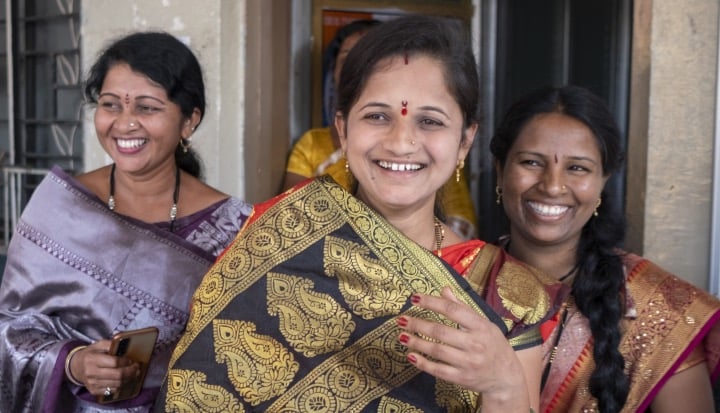A 34-year-old mother of five, Mestawet lives in the town of Wendo Genet, in Ethiopia’s forested highlands. She had long earned a small income for her family by handwashing other people’s clothes. But her life changed for the better when she became a sales agent for Kidame Mart – a social enterprise that empowers female entrepreneurs to sell useful household products to those living in remote and rural locations. After being trained in business skills and financial literacy, Mestawet has since improved her income by selling Unilever products as she goes door-to-door, offering her washing services. Her confidence heightened by this success, she now plans to expand her business.
Mestawet’s story is a prime example of the economic benefits of unleashing women’s potential. Empowering women and girls doesn’t just benefit them, but their households too. In Mestawet’s case, an increased income allowed her to boost her family’s standard of living and social status so that they feel equal to their neighbours.
In most cases, the positive impacts extend further still…
Greater gender equality enhances economic efficiency and progresses most development outcomes. If women can make use of their skills and talents, they can raise overall productivity and average living standards. Women’s existence at the epicentre of their communities means their empowerment brings further – unique – benefits. For example, they are still the main spenders of household income, especially in terms of food and children’s education. Consequently, higher incomes for women boosts wider community health and the prospects of children and young people. This societal ripple effect is one of the many reasons that empowering women is smart economics.
At TRANSFORM, raising up women, specifically female entrepreneurs, is a fundamental aspect of our work. As a joint initiative between Unilever, the UK’s Foreign, Commonwealth & Development Office (FCDO) and EY, we support visionary impact enterprises across Africa and Asia. Together, we test and scale new solutions that tackle environmental challenges, improve health and wellbeing, and build inclusive economies. Many of the social enterprises with which we partner have a clear aim of empowering women.
To evaluate the impact of this work on women and girls, we recently commissioned a report, called Lifting up Communities by Empowering Women, looking at five of our partners. The aim was to explore the enablers that help women break free from gender norms, take on a new role or business, boost their incomes and improve their families’ living standards – while also examining the barriers in their way.
The five enterprises assessed were Kasha, an e-commerce business in Rwanda and Kenya that helps rural women access socially stigmatised personal care items – like contraception, sanitary pads or HIV self-test kits. In Nigeria, D2D Pro by Bopinc enables women to sell useful ecofriendly products, like solar lights and water filters, door-to-door. Sampurn(e)arth delivers fair livelihoods for India’s informal waste workers, a large percentage of whom are women, by empowering them to organise into co-operatives that collect plastic waste for recycling. Also in India, Saraplast turns old buses into women-only public toilets. Plumbed into the sewers and powered by solar energy, these facilities are managed by women. Lastly, Kidame Mart is the Ethiopian last-mile consumer goods distribution enterprise that gave Mestawet the opportunity to improve her family’s livelihood.
The research revealed six notable impacts that these social enterprises had on the women they employed or trained as entrepreneurs:
- Higher earnings and greater financial security: Women saw an increase in their income – earning more money than through other available work. When they were able to organise their new work around other income streams, female sales agents noted an income multiplier-effect. Women who were more financially vulnerable – like older, widowed women – benefited from stable employment, particularly with enterprises that also provided access to credit and savings schemes.
- Improved skills: Women boosted their financial and digital literacy skills through training offerings designed to improve their money management. These skills were transferred to their other retail activities and applied to the management of their household finances.
- Personal development: Women reported increased confidence, self-esteem and social status. They described how they felt validated by their work. In turn, this meant they had greater ambitions for the future.
- Higher living standards: Women used their increased income to improve their households’ standards of living. There were numerous examples of women using the money to buy white goods or even build or purchase a house. These women took immense pride in their ability to finance their aspirations. In addition, they invested in their children’s or grandchildren’s education and wellbeing.
- Health benefits: Many women cited the wider mental health and wellbeing benefits of having safe and secure employment. Female sales agents selling products aimed at improving women’s health and hygiene were able to use them themselves and for their own families.
- Boosted social status: Being employed by an enterprise and bringing in income can help women overcome gender-based objections to the idea of them working, in their household. As a result, it enables them to become positive role models for their daughters, nieces and granddaughters.
At an event in London where we launched our report, we gathered experts on gender and sustainable development who shared reflections on the research. They came up with four ways that may help women in the Global South access employment and set up businesses:
- View women as agents of change, not victims.
- Ask women for what they want. Seek women’s input and listen to what they have to say.
- Offer women flexible opportunities. Even today, 75% of all unpaid domestic work is done by women. They usually aren’t free to leave the home for eight-hour stints.
- Be collaborative. Work in partnership with local organisations and empower local teams on-the-ground who fully understand cultural sensitivities.
Women are critical to eradicating global poverty. Across the developing world, they not only play a central role in farming but also remain the main caregivers, looking after both children and dependent relatives. What’s more, they are usually the people making most domestic decisions, choosing which products and services to buy. All these different roles mean they are the lynchpins of their communities and, so, key agents for positive change.
Creating a fair, prosperous and sustainable future depends on raising up women and girls. They have been held back for so long and the world needs their skills, talent and unique insights. This is why TRANSFORM plans to support even more social enterprises that challenge gender business norms in the future – and would encourage other public-private partnerships, funders or corporate partners to do the same.










